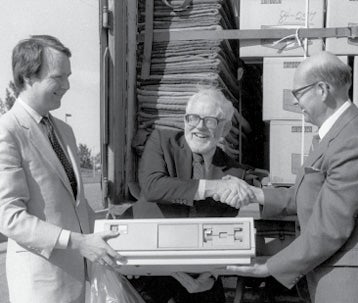“Stop the trucks," Wes Graham shouted into the telephone as a tractor-trailer full of computer hardware donated by Digital Equipment Corporation (DEC) in 1984 was leaving Toronto for the University of Waterloo.
In light of restrictions on government support, the University was anxious for these additions to its computer capabilities. But there was a problem: Graham insisted that the University follow its 1973 practice recently used in establishing Watcom by which professors retained the intellectual property rights for work that they created. DEC was equally adamant that work created from the use of the hardware that DEC was donating to the University would be the property of DEC. The confrontation was dramatic. It shocked Graham’s colleagues, who were in the room and applauded when he made the call. The trucks were stopped, Graham’s terms were agreed upon, and President Douglas Wright, jubilant, was photographed unloading the computer equipment on Waterloo’s campus.
